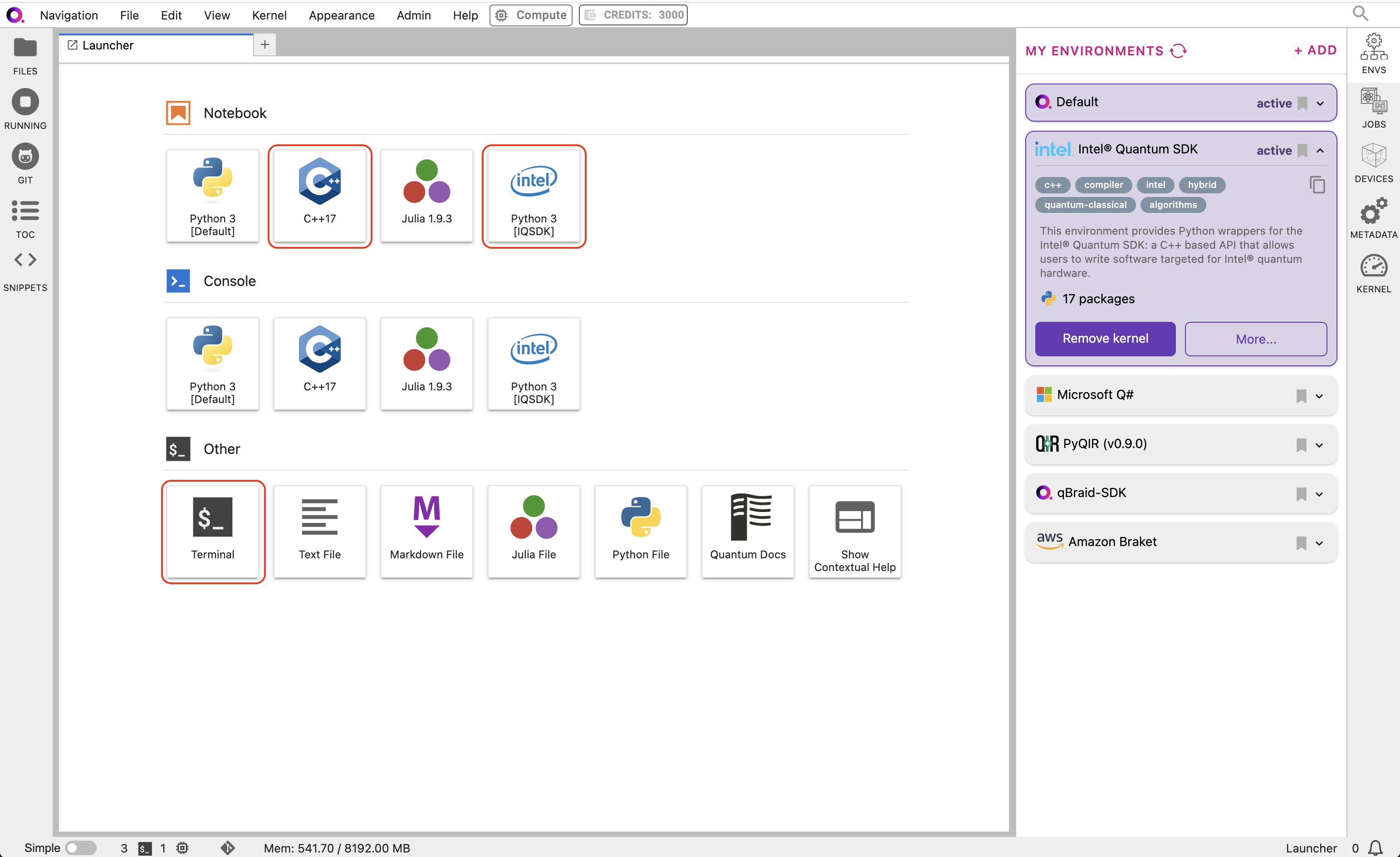Overview
Intel® Quantum SDK is a C++ based API that allows users to write software targeted for Intel quantum hardware. It is available as a pre-installed environment on qBraid Lab, and is free to access for all users. To cite the Intel® Quantum SDK, please reference:Khalate, P., Wu, X.-C., Premaratne, S., Hogaboam, J., Holmes, A., Schmitz, A., Guerreschi, G. G., Zou, X. & Matsuura, A. Y., arXiv:2202.11142 (2022)
Getting Started
Select Image & Launch Lab
At the top of your account page, open the image drop down. Select the option named Intel Free 2vCPU 4GB, and then click Launch Lab.
Add Python kernel
The Intel® Quantum SDK is designed to interoperate with Python software environments. To use this feature, in the right sidebar of qBraid Lab, locate and expand the Intel® Quantum SDK environment panel and click Add Kernel. This will create a new Python 3 kernel (markedIQSDK), which you will use to create and run your first notebook.

Python Interface
The Intel® Quantum SDK Python Interface provides an API to run quantum algorithms using Python 3, through the intelqsdk.cbindings library. The standard approach to using the Intel® Quantum SDK is to provide aquantum_kernel as C++ source in your Python environment and then
expose that kernel for operation. A second approach for interacting with Python is via the Intel® Quantum Compiler OpenQASM Bridge:
-
Write
quantum_kernelfunctions in C++, compile to a.soshared object file, setup the Intel® Quantum Simulator and call theintelqsdk.cbindingsAPIs from Python. -
Write quantum circuits in OpenQASM 2.0, convert that to a
quantum_kernelsource in C++, and use theintelqsdk.cbindingslibrary as before, all from within Python.
qBraid Specific Instructions
On qBraid, the Intel® Quantum SDK Python interface is installed in a dedicated virtual environment with environment IDintel_dk7c2g.
Before running a notebook, make sure that the Intel® Quantum SDK kernel is active. Then,
make sure it is enabled for the current notebook by selecting
Python [IQSDK] in the kernel selector in the top-right of your menu bar.
For terminal users, the environment path is discoverable via the qBraid CLI as follows:
intel environment directory.
Your First C++ Quantum Kernel
We will create and manipulate aquantum_kernel running on the Intel® Quantum Simulator directly in your notebook. This first kernel will
demonstrate a simple quantum Bell state as a common and familiar quantum computing example.
OpenQASM Support
Intel® Quantum SDK provides a source-to-source converter which takes OpenQASM code and converts it into C++ for use with the Intel® Quantum SDK. This converter requires Python >= 3.10. Currently, it only processes OpenQASM 2.0 compliant code as described by the Open Quantum Assembly Language paper: arXiv:1707.03429. To translate an OpenQASM source to a C++ file, you can run the Intel® Quantum Compiler with the -B flag to generate the correspondingquantum_kernel functions in C++ source format. If you are working from the terminal CLI with a pre-existing OpenQASM file simply
use the following syntax to create your C++ quantum_kernel source file:
